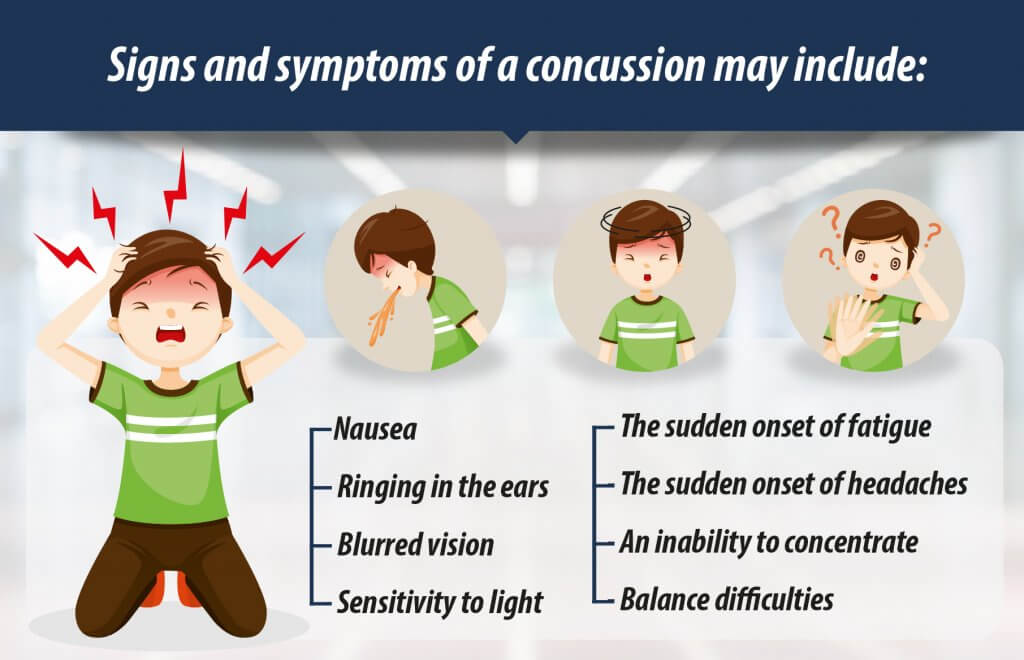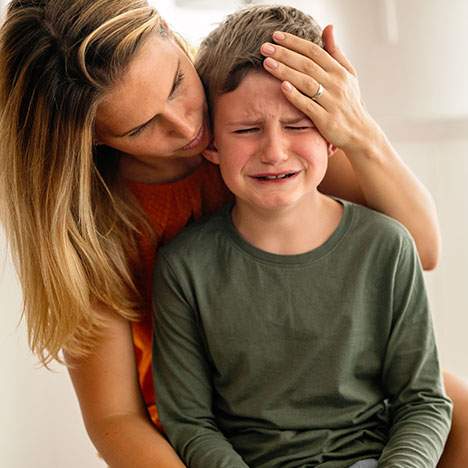Most sports-related head injuries, such as concussions — which temporarily interfere with the way the brain works—are mild and allow for complete recovery. However, concussion in children can pose serious health risks and additional toddler head injury delayed symptoms concerns.
A recent study presented at the Association of Academic Physiatrists annual meeting found that children vary in the path they follow when recovering from concussions. In fact, the recovery process can be significantly different and the study ultimately concludes that younger children and those who are high school age should be considered as separate groups when it comes to concussion recovery.
The Course of Recovery for Concussions in Children
The study finds that while concussions are common in children, there’s not much literature related to how children typically recover from these injuries—especially when it comes to concussions that aren’t sports related and to children who are younger. The study’s main point of interest is how children’s levels of activity affect the amount of time it takes them to recover from a concussion.
The study looked at a variety of variables and ultimately concluded that for high school aged children, being a boy and being involved in higher levels of exercise were both associated with a shorter recovery period. For children in lower grades, higher levels of both exercise and school participation—including attending class, doing homework, and taking tests—were indicators of a shorter recovery period.
It’s unclear why some people develop post-concussion syndrome and others don’t. The severity of the concussion doesn’t appear to affect the risk of post-concussion syndrome, although some research indicates that suffering repeat concussions might increase the risk of post-concussion syndrome.
Researchers continue to study other potential long-term effects of concussions. Having a concussion puts children at higher risk of having another. The effects of repeat concussions over the years can multiply.

Signs and symptoms of a concussion may include:
- Nausea
- Ringing in the ears
- Blurred vision
- Sensitivity to light
- The sudden onset of fatigue
- The sudden onset of headaches
- An inability to concentrate
- Balance difficulties
The bottom lines is concussions in kids can be serious. If you’re asking yourself “My child was in a car accident and has a head injury – what do I do?” it’s important to speak with a knowledgeable attorney about the next steps to take.
An Individualized Approach to Concussions
The study’s stated goal is to help identify those modifiable lifestyle factors that will help shape future recommendations for speedier concussion recovery. The study determined that high school aged children and younger children should be considered as two separate groups when it comes to calculating risk factors for a prolonged concussion recovery.
Additionally, the study concluded that participation in school and in physical activity aren’t generally harmful to children who are recovering from concussions and that these factors don’t typically prolong the recovery process. Finally, the study concludes that more in-depth research is in order.
Children and Concussions

Concussions in school-age children have gotten a significant amount of press lately—especially as they relate to high-impact school sports such as football and wrestling. A concussion is a mild form of traumatic brain injury (TBI)—caused by trauma to the head—that affects the brain’s normal functioning.
Head injuries take time to heal. Children should rest from both physical and mental (cognitive) activities for a day or two after a concussion and then return to activities gradually as their symptoms allow. Children who return to school after a concussion may require some classroom adjustments, including a lighter course load or a shortened school day.
Children can develop complications if they return to sports and other activities before a concussion has healed. Another blow to the head while the initial concussion is healing can result in longer lasting symptoms or more-permanent damage. Follow this rule of thumb: If in doubt, sit it out. If there’s any suspicion of a concussion, it’s best not to return to play until symptoms improve.
A concussion’s negative effects are usually temporary and will gradually improve over time, but a concussion can lead to more significant and lingering health issues. While concussions are often called silent injuries—because they don’t always present with symptoms at the time they occur. There are some signs to look for if you think your child may have suffered a concussion and you think your toddler head injury delayed symptoms concerns are valid:
- Headache or a feeling of pressure in the head
- Nausea or vomiting
- Balance problems or dizziness
- Double or blurry vision
- Sensitivity to light or noise
- Feeling sluggish, groggy or dazed
- Difficulty paying attention
- Memory problems
- Confusion
- Slowness in understanding and responding to others
- Sleeping problems
- Mood changes
- Changes in behavior
- Changes in personality
Any indication of a concussion necessitates immediate medical attention.
How to Protect Your Children from Concussions
To protect your child head injuries and toddler concussion issues, insist on appropriate and properly fitted protective equipment — such as a helmet — during sports and other activities. However, even the best protective equipment can’t prevent all concussions.
You can have a concussion without losing consciousness. Also, a blow to the body that jars the head can result in concussion. Make sure your child’s coach knows if your child has had a concussion. Your child shouldn’t return to play until he or she has been cleared by a medical professional.
If an activity such as reading or jogging causes symptoms such as headache, the child should take a break, then resume the activity for shorter periods and gradually work up to pre-concussion levels as symptoms improve.
If you think your child has a concussion, seek immediate medical help. Your child’s doctor will determine how serious the concussion is and when it’s safe for your child to return to sports, school or other activities.
If Your Child Has Suffered a Concussion In a Car Accident, School Sport or On the Playground, Contact Avrek Law Today
If your child has suffered a significant concussion while on the playground and you need information on how to file a playground injury lawsuit, or while participating in a school sport and you need more information about can you sue after signing a waiver, you need skilled legal counsel. Child and toddler head injury delayed symptoms concerns are a real thing, and Avrek Law has the experience, skill and determination to advocate for your child’s rights. We are here to help, so please contact or call us a free consultation today.
